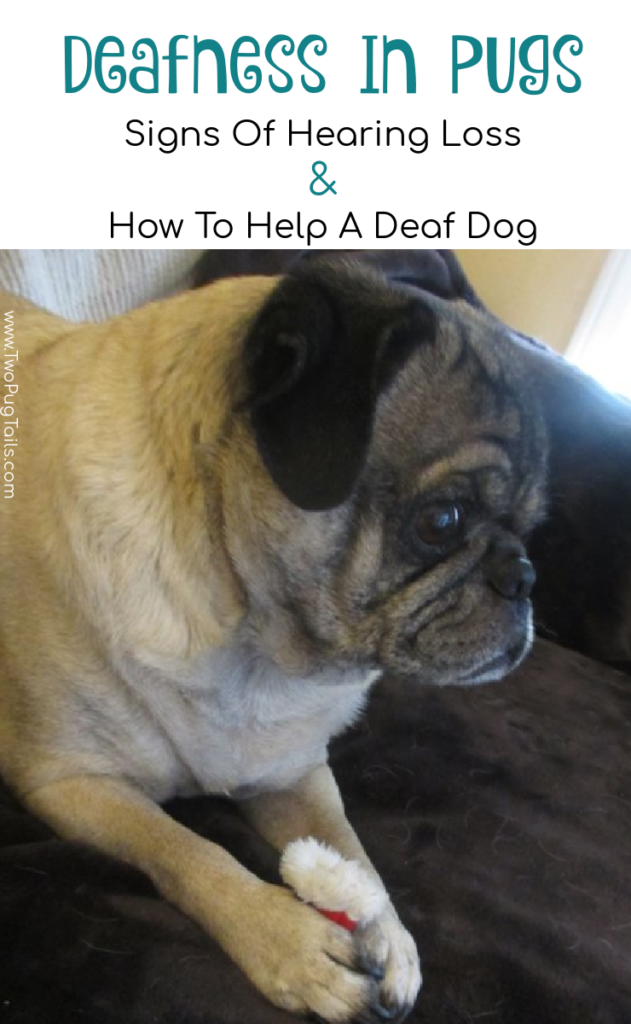
How To Tell If Your Pug Is Going Deaf
Is Hearing Loss A Normal Sign Of Aging?
Not all dogs go deaf with old age, but it is commonly seen with aging. Hearing loss in older dogs is usually caused by nerve degeneration from aging. It’s sometimes called geriatric hearing loss.
Is Deafness In Dogs Common?
According to the AKC, it’s estimated that 5 to 10% of dogs are deaf, so it is fairly common. It’s most common in dogs with piebald (spotted) colored genes dogs and merle colored genes in dogs.
Is Deafness In Pugs Common?
Pugs don’t have the coat colors associated with genetic deafness, so they aren’t particularly prone to deafness. Many pugs lose hearing in old age, though.

Signs of Hearing Loss In A Pug
- Not coming when called. If your dog used to excitedly come to you when you said their name and now they seem to ignore you…it could be that they just aren’t hearing you.
- They seem disobedient or more willful than before. If you find that yur dg is’t following commands i general or seem to be ignoring you, this could be a sign that they aren’t hearing you.
- They look in the wrong direction when noises occur. Sometimes dogs lose hearing in one ear but not the other. This can cause them to look in the wrong direction in response to a noise. This happened with my pug Beans. If she was seated facing at a 90 degree angle from the door and someone knocked (to her left) she’d look right 90 degrees instead. I believe this was a result of her hearing the sound after it ‘bounced’ and landed in her ‘good ear’.
- Looking in the wrong direction when called. If they respond to commands but just in the wrong way, this can be a sign of losing hearing in one ear.
- Startle easily when touched. If you notice your dog being more jumpy, or acting surprised, startled or even aggressive, keep a close eye on when it’s happening. If it’s happening when you approach them from behind, they may have been unable to hear your footsteps approaching, which is why the touch was so surprising.
- Barking more or louder. Have you ever noticed that people who are hard of hearing often speak too loudly (or outright yell) when speaking to others? Or how someone wearing headphones will yell when speaking to someone who isn’t wearing headphones? That’s because we determine how loud we should be based on our own hearing. Dogs are the same way. If they become harder of hearing, they may bark louder or bark more, because they aren’t hearing themselves the way they used to, and assume they need to make more noise.
- No longer responds to sounds. If your pug used to run to the door anytime a vehicle pulled in your driveway but now they stay laying down…or they used to act fearful during storms, but now they sleep soundly…or they used to go nuts when you squeaked a squeaky dog toy but now they don’t? These can all be signs of hearing loss. They may also not react to your doorbell, someone knocking, food being poured in their bowl, animal noises in real life or on TV, etc.

How to Determine If Your Pug Is Going Deaf
You can try to make a variety of sounds while your dog cannot see you, to see if they respond. Get behind them and call their name. You can also try to clap, stomp, bang something, whistle, etc. If your dog responds to some sounds but not to others, people sometimes assume this is “selective hearing” or intentionally ignoring certain things. What is more likely is that your dog hears some pitches but not others. In many cases dogs lose the ability to hear high pitched sounds first. So if your dog no longer comes when you whistle, but responds if you tell him to sit, he may have just lose those high-pitch tones. In other cases, dogs lose lower pitches first but can still hear high pitches. Anyway, just experimenting with seeing how your dog responds to various sounds will give you a rough idea of whether or not they’re hearing or not.
You can also visit your vet to have them examine your dog and test their hearing if you want an official answer.
Can Deafness Be Reversed?
In most cases, deafness cannot be reversed. If your dog has lost hearing from aging, that isn’t reversible. Some dogs are born deaf, and that usually cannot be fixed, either.
There are some less common causes of hearing loss that can sometimes be reversed. These causes would be if they have lost hearing from an infection, a tumor (if it can be removed), or a foreign object blocking the ear canal. Typically, infections of the ear do not cause hearing loss. However, if your dog has recently seemed to lose hearing and they show any signs of an infection (red ears, a lot of wax, scratching at their ears, an odor from their ears, or if their ears are hot to the touch) definitely get the infection treated. You may luck out and have their hearing improve once the infection is gone.
Tips For Coping With A Deaf Pug
- Let anyone/everyone around your pug know the dog is deaf. This will let them know to not expect the pug to hear them. It’s also a good idea to suggest to them that they don’t ‘sneak up on’ the pug, and to make sure the pug has seen them before touching them. Even when leaving my pug at the vet, I’d remind the vet and any vet techs around that she was deaf.
- Don’t leave your deaf pug around young children. Young children will struggle to understand what it’s like for the dog to be deaf, and may behave in ways that accidentally startle your pug. This could put your pug at risk of responding in fear or being aggressive. Even if your deaf pug has never been aggressive before, it’s best to be very cautious with deaf pugs and children.
- Learn to use gestures with your commands. Dogs read our body language pretty well in most cases. After my pug stared to lose their hearing, I realized she still knew when it was time to go inside, because I tended to “wave” her towards the door when saying “lets go inside”. I had never done this gesture thoughtfully, it was just instinctual for me. I realized that as she was losing her hearing she still understood the gesture, which was really beneficial so I started to try to use gestures with other commands, too. I was able to point to the food or water dish to let the pugs know they were refilled. I could pat my leg to let them know I wanted them to come near me, and so on.
- Stay close by. We live in the country and had a really big yard. When my pugs still had good hearing, I’d let them wander a ways from me as long as they didn’t get too close to the road. I knew they’d come if I called their name, so I didn’t need to be real close to them for them to be safe. After they started losing their hearing, I didn’t let them wander as far. I felt it was safest to be within a distance where I could run and grab them within just a few seconds if need be. I couldn’t rely on them hearing me and listening to commands anymore, so I needed to be able to physically access them if an emergency were to occur.
- Make sure they see you before you touch them. Making sure they see you before you touch them will keep them from startling.
If you have a deaf pug, leave a comment sharing any tips and tricks that you have that may help others.

Leave a Comment